Poirot: Series 13 Blu-ray Movie
HomePoirot: Series 13 Blu-ray Movie 
Acorn Media | 2013 | 462 min | Not rated | Nov 04, 2014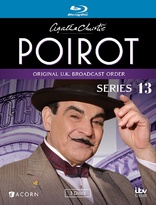
Movie rating
8.3 | / 10 |
Blu-ray rating
| Users | 0.0 | |
| Reviewer | 4.5 | |
| Overall | 4.5 |
Overview
Poirot: Series 13 (2013)
Elephants Can Remember / The Big Four / Dead Man's Folly / The Labours of Hercules / Curtain: Poirot's Last Case
Starring: David Suchet, Hugh Fraser (I), Philip Jackson (II), Pauline Moran, David YellandDirector: Edward Bennett (I), Andrew Grieve, Renny Rye, Brian Farnham
| Period | Uncertain |
| Mystery | Uncertain |
| Crime | Uncertain |
| Drama | Uncertain |
| Thriller | Uncertain |
Specifications
Video
Video codec: MPEG-4 AVC
Video resolution: 1080p
Aspect ratio: 1.78:1
Original aspect ratio: 1.78:1, 1.33:1
Audio
English: DTS-HD Master Audio 2.0 (48kHz, 24-bit)
Subtitles
English SDH
Discs
50GB Blu-ray Disc
Three-disc set (3 BDs)
Packaging
Slipcover in original pressing
Playback
Region A (locked)
Review
Rating summary
| Movie | 5.0 | |
| Video | 4.5 | |
| Audio | 4.0 | |
| Extras | 2.0 | |
| Overall | 4.5 |
Poirot: Series 13 Blu-ray Movie Review
"I played the game"
Reviewed by Michael Reuben November 4, 2014When the final episode of Poirot was first shown in the U.K. in November 2013, it capped the conclusion of nearly a quarter century for actor David Suchet's television portrayal of Agatha Christie's most famous detective. As Suchet reveals in the interview included with this Blu-ray set of the final series of Poirot, he had no ongoing contract and never knew from year to year whether the show would continue to the point it has now reached, where, with a few minor exceptions, all of Christie's Poirot stories have been filmed. But how could it have been otherwise? Other actors had portrayed the eccentric Belgian sleuth both effectively and memorably, but no one had given him a life beyond the screen as Suchet has. With each new series, the distribution of Poirot had expanded. The show is now available in every territory with a broadcaster. The appeal of Poirot transcends differences of language, culture, race and ethnicity. The feature-length episodes that comprise Poirot's swan song are notable for several things, including their stylish photography, their elegant locations and the return (all too briefly in some instances) of familiar faces from the show's early days. Of particular importance is Poirot's old friend of limited insight but stout-hearted character, Captain Arthur Hastings (Hugh Fraser), who plays a crucial role in the final episode entitled Curtain: Poirot's Last Case. Although all five of the Series 13 episodes may eventually appear on PBS, at the moment the only way to see the whole collection is either on disc or by subscribing to the Acorn TV web service. As controlling owner of the Christie Estate, Acorn served as co-producer of these episodes and is their principal distributor in North America.
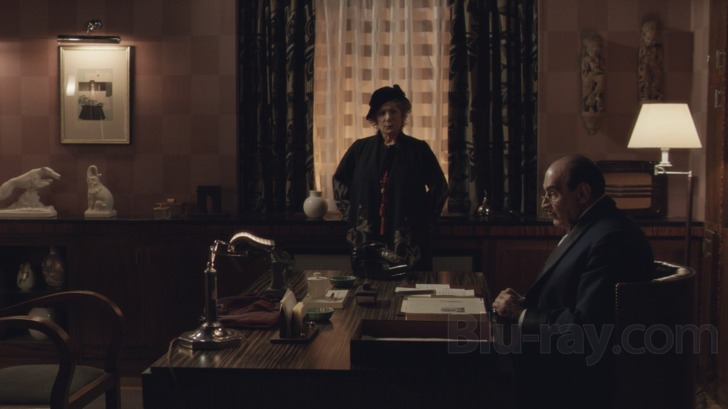
Elephants Can Remember (disc 1) (first broadcast: June 9, 2013, U.K.) Elephants Can Remember occupies an odd place in Agatha Christie's canon. It was the last Poirot novel she wrote, although it was not the last to be published. Christie had planned Poirot's exit long before, writing Curtain: Poirot's Last Case during World War II and locking it in a bank vault in case she did not survive. Elephants, which was published in 1972, seems far from such concerns, and detached form the world of Curtain, in large part because it rests on Poirot's relationship with the crime writer, Ariadne Oliver (Zoë Wanamaker), who did not become a major figure in the Poirot stories until after the war. As with nearly all of the plots in Poirot, the story has been re-set in the thirties by screenwriter Nick Dear (who also adapted Dead Man's Folly for this series). In an opening flashback, we see a young married couple, General and Lady Ravenscroft (Adrian Lukis and Annabel Mullion), die of gunshot wounds on a cliff outside their house in Overcliffe. No one can decide whether it is a double suicide or a murder/suicide. Their young daughter, Celia, is sent abroad to school. Thirteen years later, Celia Ravenscroft (Vanessa Kirby) has returned to England and is engaged to Desmond Burton-Cox (Ferdinand Kingsley), whose mother (Greta Scacchi) doesn't seem too pleased by the match. Ariadne Oliver is Celia's godmother, although, by her own admission, she hasn't done much for the girl except write her a check on her eighteenth birthday. But now Mrs. Oliver has been asked to do something special for Celia, which is to find out exactly what happened to her parents. Who killed whom, and most importantly, why? Mrs. Oliver calls on her famous detective friend for help, but Poirot is immersed in a case involving the murder of a retired psychiatrist whose son, another doctor named Willoughby (Iain Glen), cannot understand why anyone would want to hurt a harmless elderly physician. So Poirot advises Mrs. Oliver to investigate for herself. Go to Overcliffe, he says. Ask people who knew the Ravenscrofts what they remember. Ariadne calls this a search for "elephants" because of the animals' reputation for long memories. Anyone familiar with Agatha Christie's plots will already suspect that Poirot's case and Mrs. Oliver's inquiries will eventually reveal a connection. It turns out that the murdered psychiatrist once treated a patient involved with the Ravenscroft family. When Poirot hears what Mrs. Oliver has learned from her "elephants", he quickly discovers that nothing is what it seems where the Ravenscrofts are concerned. The Big Four (disc 1) (first broadcast: Oct. 23, 2013, U.K.) The Big Four was published in 1927, forty-five years before Elephants Can Remember, but no one had tried to adapt it for Poirot until now, because it was considered "an unfilmable mess", in the words of writer Mark Gatiss, one of the creators of the BBC's Sherlock. But Gatiss and his partner, Ian Hallard, gamely hacked away at the text, trimming the list of characters, rearranging the plot and streamlining events. The story's confusion worked to their advantage. You know what you're seeing can't be right, but you still aren't sure what's going on. The Big Four marks the Series 13 reunion of the original gang from the early years of Poirot: Chief Inspector—now Assistant Commissioner—Japp (Philip Jackson), Miss Lemon (Pauline Moran) and reliable Captain Hastings, whose familiar exclamation of "Good Lord!" is a welcome reminder of old times. Joining these stalwarts is Poirot's indispensable valet, George (David Yelland), who has taken charge of the detective's daily affairs since Miss Lemon moved on. They are reunited for the sad occasion of Hercule Poirot's funeral and—wait a minute! This isn't the episode entitled Poirot's Last Case. What's going on? Gatiss and Hallard have shifted The Big Four forward in time to the eve of World War II, when rumblings of hostilities abound throughout Europe. Opposing the drumbeat of violence, a Peace Party has sprung up with the backing of an American millionaire, Abe Ryland (James Carroll Jordan), a French scientist, Madame Olivier (Patricia Hodge) and a Chinese pacificist, Li Yang Chen, who cannot leave Hong Kong. But the Peace Party has powerful enemies. At an exhibition chess match intended to draw publicity and raise funds, the famous Russian grandmaster lured out of retirement to play an exhibition game is murdered, drawing protests from the Soviet government and endangering its support for the Allied cause. An ambitious Fleet Street journalist, L.B. Tysoe (Tom Brooke), tells Poirot that the murder was committed by an international criminal conspiracy called "The Big Four", which is rumored to want the Peace Party to fail because The Big Four is heavily involved in the arms trade. Tysoe has a confidential source, but he shortly becomes a victim of the Big Four. Meanwhile, organizers of the Peace Party begin to disappear. Have they been kidnapped, murdered or gone into hiding? News that the world's most famous detective, Hercule Poirot, is investigating the Big Four leads to the explosive turn of events that brings Japp, Hastings, George and Miss Lemon to a graveside where they watch a coffin with Poirot's name being lowered into the ground. But there is more to come—so much more—before the final Curtain.


Poirot: Series 13 Blu-ray Movie, Video Quality 
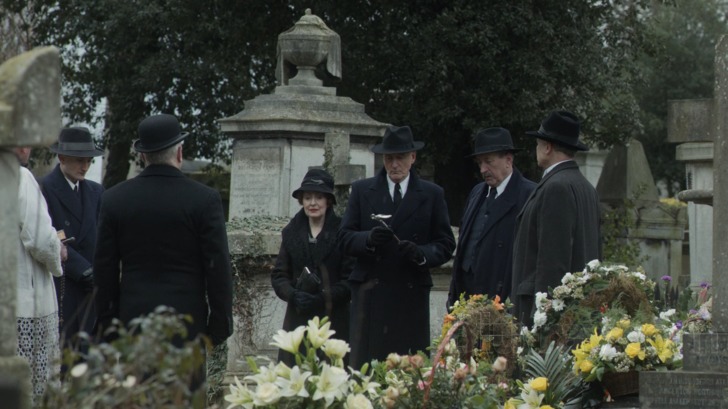
Poirot continued to be shot on film even after many British television shows had switched to digital capture, but the episodes in Series 13 were acquired digitally (unless I have misjudged the make of the cameras pictured in the photo gallery included in this Blu-ray set). The image on Acorn Media's three 1080p, AVC-encoded Blu-rays for Series 13 are consistent with those of Series 12 and indeed superior, which no doubt reflects advances in technology at every step of the chain, from initial capture to mastering and replication. Some degree of diffusion, whether applied in camera or in post-production, has frequently been an element of Poirot's style, and Series 13 is no exception, especially in the valedictory episode, Curtain: Poirot's Last Case. Even with diffusion, however, there is no mistaking the deep blacks, rich colors and copious detail that allow the viewer to appreciate the ideally chosen locations and careful period recreations by the Poirot design team. Christie's most famous creation inhabited a bygone world of well-appointed drawing rooms, formal attire and gracious living, and one of Poirot's many eccentricities was to carry that world with him, and recreate it as much as possible, wherever he went. (Note how he always spreads a spotless linen handkerchief on an outdoor bench before sitting down.) As Poirot grew more successful, greater resources were devoted to the period recreations and impressive sets. The settings in these last five episodes are some of the most elaborate yet, and the Blu-ray image shows them to best advantage.
Poirot: Series 13 Blu-ray Movie, Audio Quality 
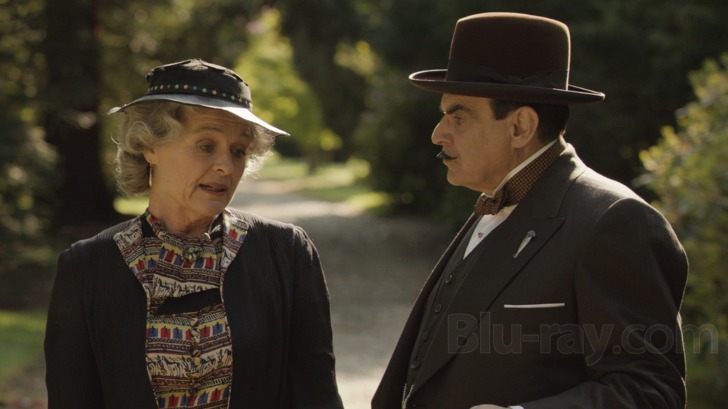
To the last, Poirot continued to have a basic stereo soundtrack that emphasized the literate dialogue and essential sound effects. The track is encoded in lossless DTS-HD MA 2.0 and sounds flawless. Christian Henson, who so effectively scored Series 12, returned for the final episodes, with a score that is by turns lively, foreboding and emotional. It also invokes Christopher Gunning's original Poirot theme at all the right moments.
Poirot: Series 13 Blu-ray Movie, Special Features and Extras 
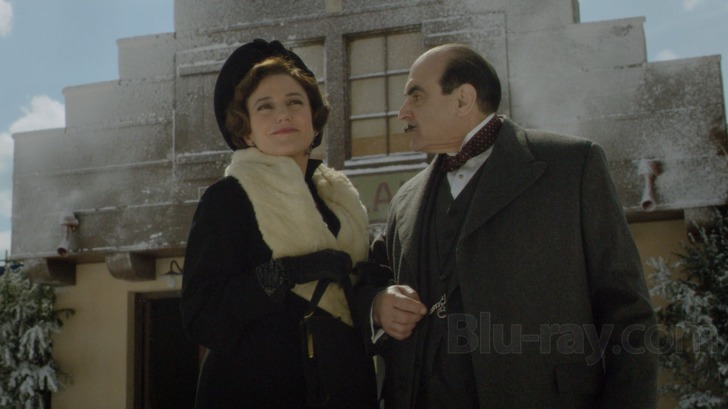
- Interview with David Suchet (1080p; 1.78:1; 18:45): Interviewed at Agatha Christie's former home at Greenway during the filming of Dead Man's Folly, Suchet answers a wide array of questions about twenty-four years of playing Hercule Poirot. This interview appears to be an excerpt from the 50-minute BBC special, Being Poirot, which aired in the U.K. on the same night as Curtain.
- Photo Gallery (1080p; various; 1:54): A slide show composed of both production stills and behind-the-scenes photos.
- Additional Trailers: At startup, disc 1 players trailers for Acorn Media, Les Petits Meurtres d'Agatha Christie and David Suchet: In the Footsteps of St. Paul, which can be skipped with the chapter forward button and are not otherwise available once the disc loads.
Poirot: Series 13 Blu-ray Movie, Overall Score and Recommendation 
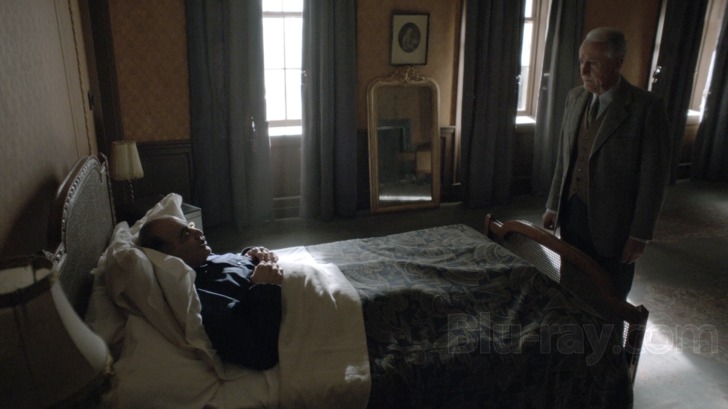
Concurrently with the release of Series 13, Acorn Media is also releasing Poirot: The Final Cases Collection, which includes Series 7 through 13 and completes the set for those who already own Poirot: The Early Cases Collection. Acorn is also releasing Poirot: The Complete Cases Collection for those who are starting from scratch. However one chooses to acquire Poirot, it represents a unique achievement in the history of film and television: a nearly 25-year effort to realize the entire career of a single author's beloved creation in dramatic form with the same actor playing the part continuously. No one will ever attempt this again with Hercule Poirot. No one may ever attempt anything like this again, full stop. As for Series 13, highest recommendation.
Other editions
Poirot: Other Seasons

Poirot: Series 1
1989

Poirot: Series 2
1990

Poirot: Series 3
1991

Poirot: Series 4
1992

Poirot: Series 5
1993

Poirot: Series 6
1995-1996

Poirot: Series 7 & 8
2000-2001

Poirot: Series 9
2003-2004

Agatha Christie's Death on the Nile
2004

Poirot: Series 10
2006

Poirot: Series 11
2008-2009

Poirot: The Movie Collection - Set 6
2009-2010

Poirot: Murder on the Orient Express
2010

Poirot: Series 12
2010-2011
Similar titles
Similar titles you might also like
(Still not reliable for this title)

The Mirror Crack'd
1980

State of Play
2009

Murdoch Mysteries: Season 18
The Artful Detective
2024-2025

Zodiac 4K
Theatrical 4K | Director's Cut BD only
2007

Foyle's War: Set 8
2014

The Night of the Generals
Limited Edition to 3000 - SOLD OUT
1967

Murder on the Orient Express 4K
50th Anniversary Edition
1974

Miss Marple: Volume 1
The Murder at the Vicarage / The Body in the Library / The Moving Finger / A Murder is Announced
1984-1986

The Raven
2012

Murder on the Orient Express
2017

Twisted
2004

The Black Dahlia
2006

Evil Under the Sun
1982

Gosford Park
Arrow Academy
2001

Crooked House
2017

The Girl with the Dragon Tattoo
2011

The Bone Collector 4K
1999

Murder by Decree 4K
1979

Taboo: Season One
2017

L.A. Confidential
1997